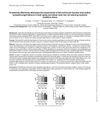 151 citations,
May 2014 in “American Journal of Clinical Dermatology”
151 citations,
May 2014 in “American Journal of Clinical Dermatology” Effective treatments for male pattern baldness include oral finasteride and topical minoxidil, while topical minoxidil is best for female pattern baldness.
 October 2023 in “Biomaterials”
October 2023 in “Biomaterials” Nanotechnology could improve hair regrowth but faces challenges like complexity and safety concerns.
December 2022 in “Molecular Pharmaceutics” Latanoprost-loaded nanotransfersomes could help treat hair loss by promoting hair growth.
 14 citations,
January 2015 in “Current problems in dermatology”
14 citations,
January 2015 in “Current problems in dermatology” Female pattern hair loss treatments vary in effectiveness and may have side effects.
 13 citations,
January 2016 in “Journal of cosmetology & trichology”
13 citations,
January 2016 in “Journal of cosmetology & trichology” Alternative treatments show promise for hair growth beyond traditional methods.
 2 citations,
January 2018 in “Dermatology Review/Przegląd Dermatologiczny”
2 citations,
January 2018 in “Dermatology Review/Przegląd Dermatologiczny” Use trichoscopy to diagnose hair loss; treat with minoxidil, finasteride, or dutasteride; consider platelet-rich plasma and spironolactone.
 1 citations,
July 2018 in “Elsevier eBooks”
1 citations,
July 2018 in “Elsevier eBooks” Many treatments for hair loss show potential, but more testing is needed to confirm their effectiveness. Only minoxidil for women and minoxidil and finasteride for men are FDA approved.

There are many treatments for common hair loss, but more trials are needed to decide which are best.
 205 citations,
March 2012 in “Science Translational Medicine”
205 citations,
March 2012 in “Science Translational Medicine” PGD2 stops hair growth and is higher in bald men with AGA.
August 2015 in “PLOS ONE”  32 citations,
February 2019 in “Journal of neurochemistry”
32 citations,
February 2019 in “Journal of neurochemistry” Sex hormones affect brain injury differently in males and females.
 28 citations,
November 2020 in “Journal of Controlled Release”
28 citations,
November 2020 in “Journal of Controlled Release” A new hair loss treatment uses tiny needles to deliver a drug-loaded lipid carrier, promoting hair growth more effectively than current treatments.
 15 citations,
July 2016 in “Urologic Clinics of North America”
15 citations,
July 2016 in “Urologic Clinics of North America” Finasteride and dutasteride are effective for long-term treatment of enlarged prostates but have sexual side effects and a risk of high-grade prostate cancer.
 12 citations,
July 2020 in “International Journal of Pharmaceutics”
12 citations,
July 2020 in “International Journal of Pharmaceutics” Iron oxide nanoparticles improve skin penetration and drug release for hair loss treatment.
 1 citations,
January 2024 in “Journal of molecular structure”
1 citations,
January 2024 in “Journal of molecular structure” The new finasteride delivery system using chitosan-based nanoniosomes shows promise for prostate cancer prevention.
 December 2023 in “Alzheimer's & dementia”
December 2023 in “Alzheimer's & dementia” Finasteride may help reduce anxiety and depression in elderly but might cause depression in young men.
 November 2023 in “International Journal of Pharmaceutics”
November 2023 in “International Journal of Pharmaceutics” The new delivery system improves treatment for hair loss by enhancing drug absorption and effectiveness.
April 2022 in “The Journal of Urology” Men may experience long-term sexual dysfunction after stopping Finasteride.
 77 citations,
April 2004 in “Gene expression patterns”
77 citations,
April 2004 in “Gene expression patterns” The three estrogen receptor genes are highly expressed in zebrafish neuromasts during development.
July 2024 in “Behavioural Brain Research” Long-term finasteride treatment reduces depression and brain issues in obese male rats.
 November 2023 in “European heart journal”
November 2023 in “European heart journal” Finasteride improves heart function and balance in aging and obese male rats by reducing oxidative stress.
 November 2021 in “International Journal of Immunology and Microbiology”
November 2021 in “International Journal of Immunology and Microbiology” Thyroid hormone imbalances can cause hair loss in alopecia patients.
January 2020 in “대한미용학회지” Natural ingredients like plant extracts and marine life show promise for improving scalp health and reducing hair loss.
 24 citations,
May 2015 in “Schizophrenia Research”
24 citations,
May 2015 in “Schizophrenia Research” A drug improved schizophrenia-like symptoms in stressed rats by changing brain steroid levels.
September 2024 in “Chemico-Biological Interactions” Finasteride improves heart function in obese and aging male rats by reducing oxidative stress and p53 protein levels.
 July 2023 in “Journal of Drug Delivery Science and Technology”
July 2023 in “Journal of Drug Delivery Science and Technology” Finasteride niosomes were developed and found to be effective in treating hair loss, with better results than commercial minoxidil, and could be a promising topical treatment for hair loss.
June 2021 in “Current developments in nutrition” High doses of finasteride lower cholesterol and body weight in certain mice.
 February 2024 in “International journal of pharmaceutical sciences and nanotechnology”
February 2024 in “International journal of pharmaceutical sciences and nanotechnology” Nanocarriers in gel may reduce side effects of oral hair loss treatments.
 December 2023 in “International Journal of Biomedicine”
December 2023 in “International Journal of Biomedicine” Topical finasteride might help with male hair loss with fewer side effects than pills, but more research is needed.
June 2017 in “DOAJ (DOAJ: Directory of Open Access Journals)” Combining finasteride with dimethyl-β-cyclodextrin improves its absorption and bioavailability.






















